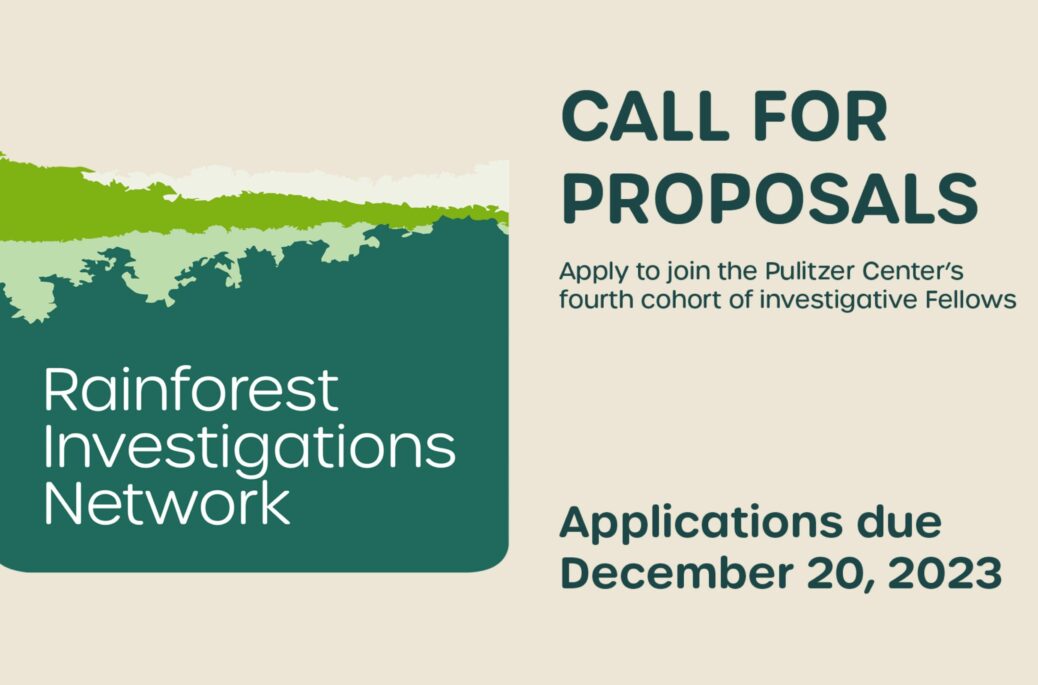Call for the Pulitzer Center Rainforest Investigations Network Fellowships 2024 are open now!!!
The Pulitzer Center, a nonprofit organization that supports independent journalism, is now accepting applications for its Rainforest Investigations Network (RIN) reporting fellowships.
Few stories are more urgent—and global—than the destruction of the planet’s tropical rainforests. The Pulitzer Center’s RIN seeks to create an ecosystem of collaboration among journalists to follow the money and the many illegal practises and legal loopholes that enable industrial-scale deforestation.
The network seeks to harness investigative reporting and cross-border collaboration to tackle stories at the intersection of climate change, corruption, and governance in the world’s three main tropical rainforest regions: the Amazon, Congo Basin, and Southeast Asia. The RIN Fellows will work on individual and collaborative reporting projects to systematically probe the drivers of deforestation across the three main rainforest regions.
The network is seeking to recruit experienced investigative journalists in each of the tropical rainforest regions as well as journalists based at global media outlets.
The full-time, yearlong fellowships will cover the reporter’s salary (or part of it, depending on location) and provide additional support for the media outlet that employs the journalist (if on staff) or that agrees to host the Fellow (if a freelancer).
This year they are actively seeking investigations that include, or are tailor-made for, a cross-border approach. If the applicant has yet to secure commitments from their collaborators, they should explain their collaboration plan. The network will also actively work with the selected Fellows to identify potential partners within the network. Please note that applications should be made by individuals and not by a group or media outlet.
The main topics to be reported are:
- Stories that investigate the financial enablers, financiers, and accountability of the use of this resources
- Corruption on public procurement
Fellows are expected to devote a full year to their rainforest investigations and to publish their series or main story during the year of the fellowship. They will receive training and data, communication, research, and coordination support from the Pulitzer Center. They will work closely with their co-Fellows around the world, benefiting from one another’s skills and diverse perspectives.
The initiative will also collaborate with the Pulitzer Center’s engagement team. Fellows will have the support of local education and outreach coordinators, who will identify outreach opportunities to share investigation findings with diverse audiences.
Location:
OnlineBenefits
BENEFITS FOR RIN FELLOWS
- The opportunity to work on impactful investigations that are time-consuming and costly
- A global network of investigative reporters who will aid the fellow’s investigations and complement their skills
- Access to data and documents as well as the opportunity to sharpen the fellow’s data skills with support from the Pulitzer Center’s data and research team
- Specialized training opportunities such as the use of satellite imagery and other digital tools in investigations, corporate and follow-the-money research, and more
- The opportunity to work and collaborate with other journalists on stories that transcend the fellow’s country and region and can achieve true global impact
- A community of like-minded colleagues that will continue beyond the fellowship
- The possibility of renewing the fellowship for an additional one or two years, based on performance
- Salaries commensurate with experience
- Reporting expenses such as travel, consultants and technology up to US$ 10,000 during the entire fellowship
- Please note that selected candidates will work remotely
Eligibilities
- Experienced investigative journalists with a proven track record covering the Amazon, Congo Basin, and Southeast Asia regions.
- Reporters based in countries outside the three main tropical rainforest regions—Amazon, Congo Basin, and Southeast Asia—may also apply but will need to focus their reporting during the fellowship on stories related to these regions.
- Staff or freelance journalists working on a wide range of platforms, including print, radio, video, and multimedia. Freelance reporters will need to have the support of a local or international newsroom that agrees to host them and publish the work they produce during the fellowship.
- Team players with the experience and/or ability to work collaboratively across newsrooms and borders.
- Reporters with a deep understanding of the scientific, environmental, social, legal, political, and commercial forces at play in deforestation and forest degradation around the world—and why this issue matters to our global well-being.
- Reporters are willing to participate in outreach activities related to their investigations, such as meetings in communities and visits to schools and universities.
Application Process
To apply, the applicant will be asked to provide the following:
- A statement of purpose: How does this fellowship fit in the applicant’s career path and why are they best positioned to be a Rainforest Investigations Network Fellow? The applicant may also include how collaboration with journalists from other regions can benefit their investigations or how they might be able to assist them. (500 words)
- An investigative project proposal describing the most ambitious rainforest reporting the applicant seeks to pursue during their fellowship. Please do not propose general themes, but offer concrete investigative projects that aim to uncover systemic wrongdoing/abuse that is unknown or hidden. It is expected that by the time the applicant applies, they have already done pre-reporting to determine the scope, feasibility, and novelty of the project. A compelling, well-researched project proposal with a reporting plan will help them stand out among hundreds of applicants. If the investigation includes a cross-border approach, explain the collaboration plan and identify partners outside and within the network. (1,000 words)
- Three examples (links) of the applicant’s most impactful investigations published in the past three years.
- A letter of support from the applicant’s media employer or a newsroom that has agreed to host them as a Rainforest Investigations Network Fellow and publish their work.
- Three professional references: These can be either contact information or letters of recommendation.
- A copy of the applicant’s résumé or curriculum vitae.
Application Deadline: December 21, 2023
Application ClosedOfficial link









